Here’s how to make a paella recipe…the Spanish way! This stunning one pan dinner features shrimp, vegetables and all the authentic flavors of this traditional dish.
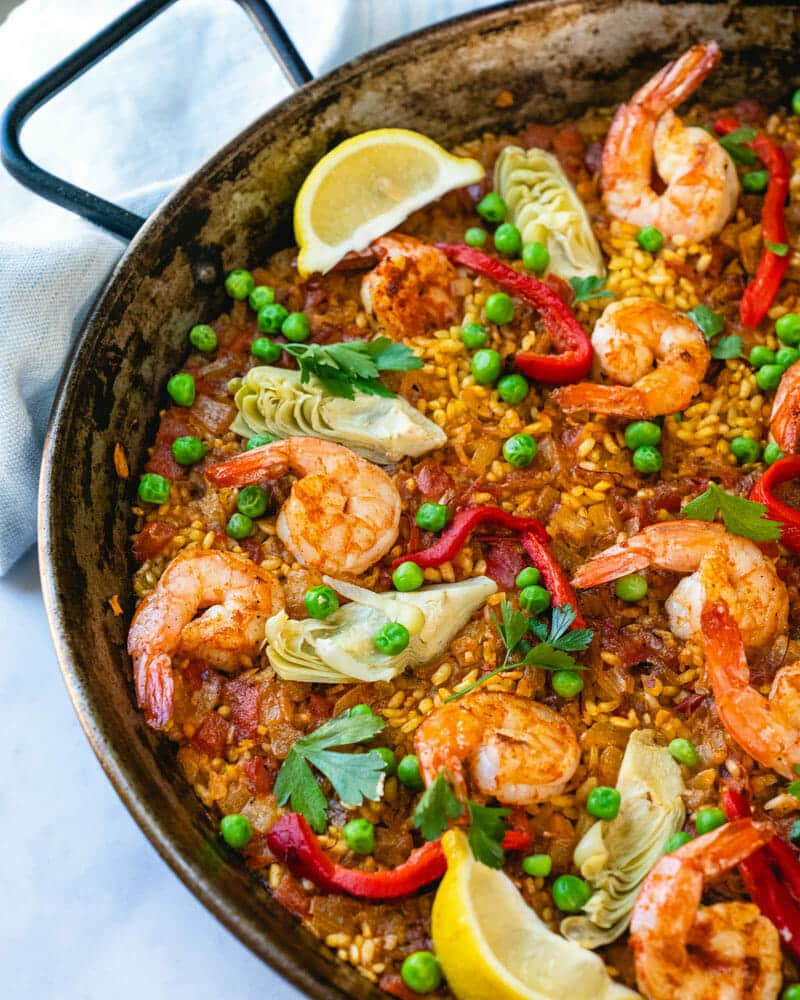
Here’s a stunning one pan dinner that’s made for celebrations: paella! This traditional Spanish rice dish has thousands of variations. but it’s always rice with an explosion of colorful toppings. This one is our best classic paella recipe, based on our travels through Spain! We’ve perfected the skills so you can try it at home. It stars saffron-scented rice, mixed colorful vegetables and shrimp, and it’s full of traditional flavor. Here’s everything you need to know to make paella at home!
What paella types are there?
Paella is a traditional Spanish dish with saffron-flavored rice topped with seafood, meat and/or vegetables and served in a shallow paella pan. There are varying sizes of paella pans: small pans for two people, and massive paella pans for a crowd. (Fun fact: the world’s largest paella was made in a pan big enough for 30,000 people!)
What types of paella are there? Spaniards themselves differ on what is the most classic, authentic paella recipe. Alex and I have eaten paella in Valencia, Barcelona, and Madrid, and all of them have been vastly different. There are four main types of paella:
- Paella de mariscos: Seafood paella with shrimp, prawns, scallops or mussels
- Paella mixta: A mixed paella with seafood, meat and vegetables
- Valenican-style paella (paella Valenciana): Chicken, rabbit, garrofó (a variety of lima bean), saffron, and rosemary
- Paella de verduras: vegetarian paella with vegetables only
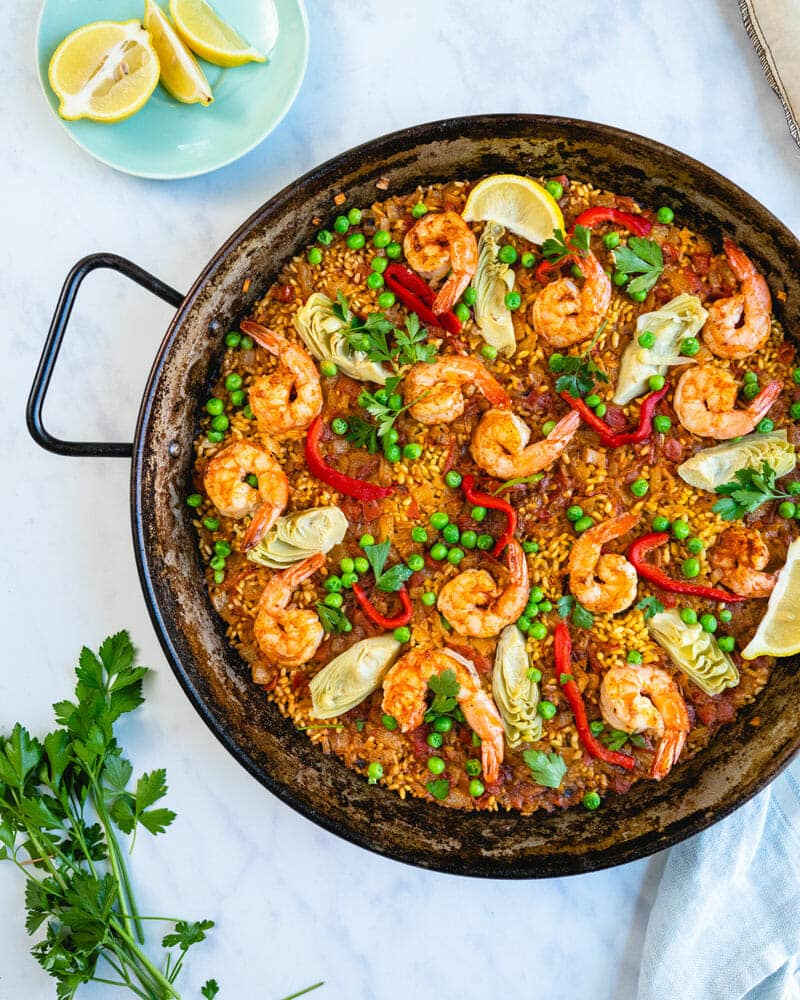
Ingredients in this paella recipe
For our best paella recipe, we used the common elements in the paella recipes we’ve had in different regions in Spain. Here’s what’s featured in this paella:
- Traditional paella pan: you can also use a skillet (see below)
- Bomba rice: you can also use arborio
- Tomato, onion and garlic to make a quick “sofrito”
- Saffron and pimentón aka smoked paprika
- Mixed vegetables like artichokes, red pepper and peas
- Seafood: you can also make vegetarian paella (see below)
- Lemon wedges: garnishing with lemon is the perfect bright finish
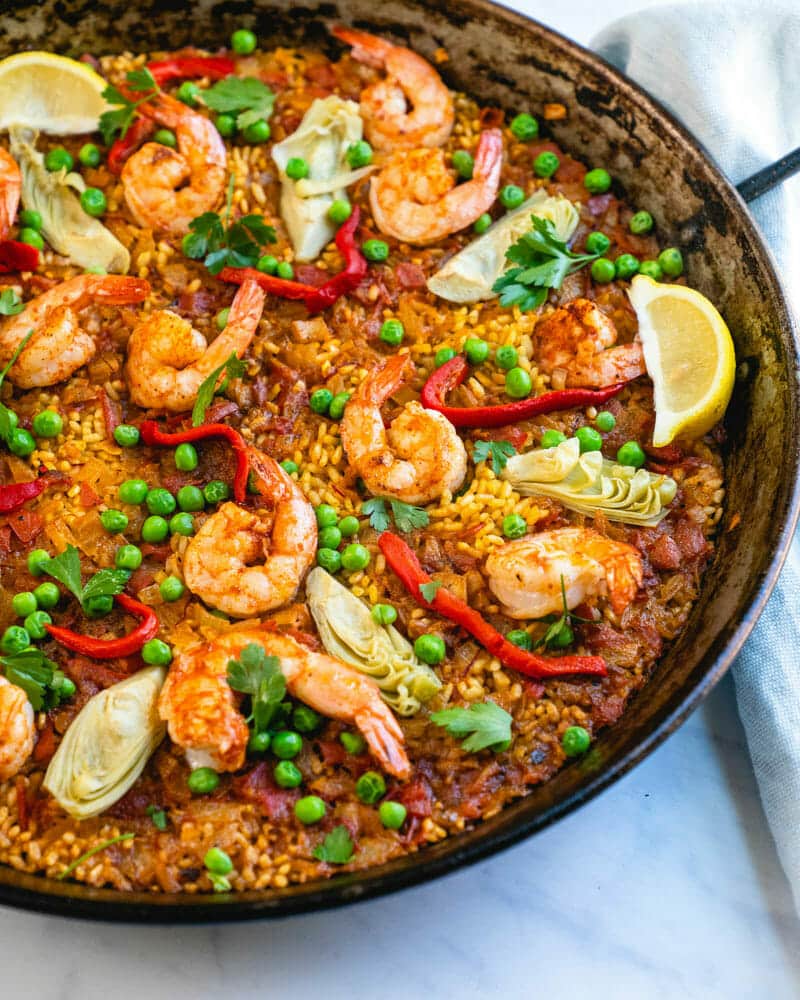
What is the best paella pan? Do you need to use one?
A paella pan is a large round, shallow pan with handles used for cooking paella. The shallow shape lets rice cook consistently and lets it dry out more than it can in a skillet. If you have a paella pan or want one, now’s the time to use it! This recipe is for a 15-inch paella pan that serves 4 people. If you’re looking for one, here’s a link to purchase a 4-person paella pan.
Don’t have a paella pan? Don’t worry! Make this paella in your largest skillet. The larger the better! You may need to adjust the cook time slightly if you are using a skillet.
Paella pan care instructions: Paella pans are made of carbon steel and can rust. Make sure to dry the pan completely after cleaning it, and rub it with a bit of vegetable oil to prevent rusting.
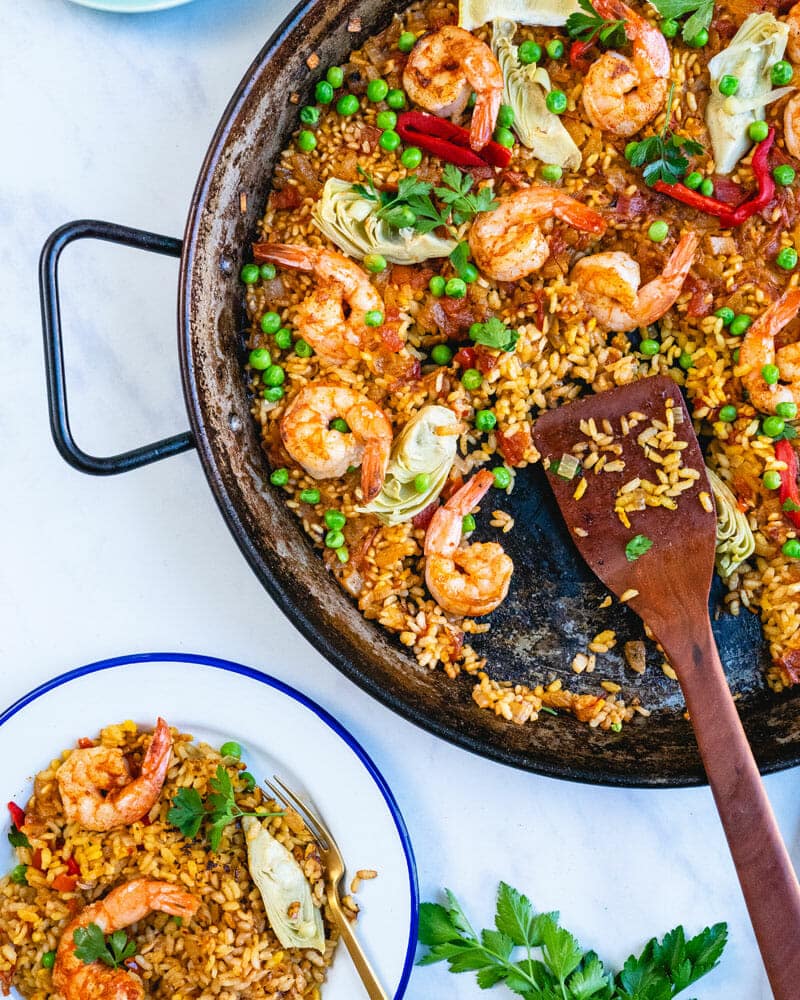
What’s the best rice to use in paella?
The most authentic paella rice type is called bomba rice. Bomba rice is a white short grain rice. You can also use Arborio rice, which is easier to find but can result in a gummier texture than bomba. Either work! For this recipe we tried bomba and felt like it had more consistent results. You can find bomba rice online. Order it: Bomba rice
The secret spices: saffron and pimentón
This is an authentic style paella recipe, so it uses two special spices to get that traditional flavor. Here’s what to know:
- Saffron brings an earthy flavor and a beautiful color to the dish. It’s an expensive spice, but it’s worth the splurge. What can you substitute for saffron? If you can’t find it or don’t want to splurge, use ½ teaspoon turmeric.
- Smoked paprika: Called pimentón or Spanish smoked paprika, this bright red spice gives the dish more color and a smoky undertone. It’s easy to find and you’ll find it in many of our recipes here. (Here are our 20 best smoked paprika recipes.)
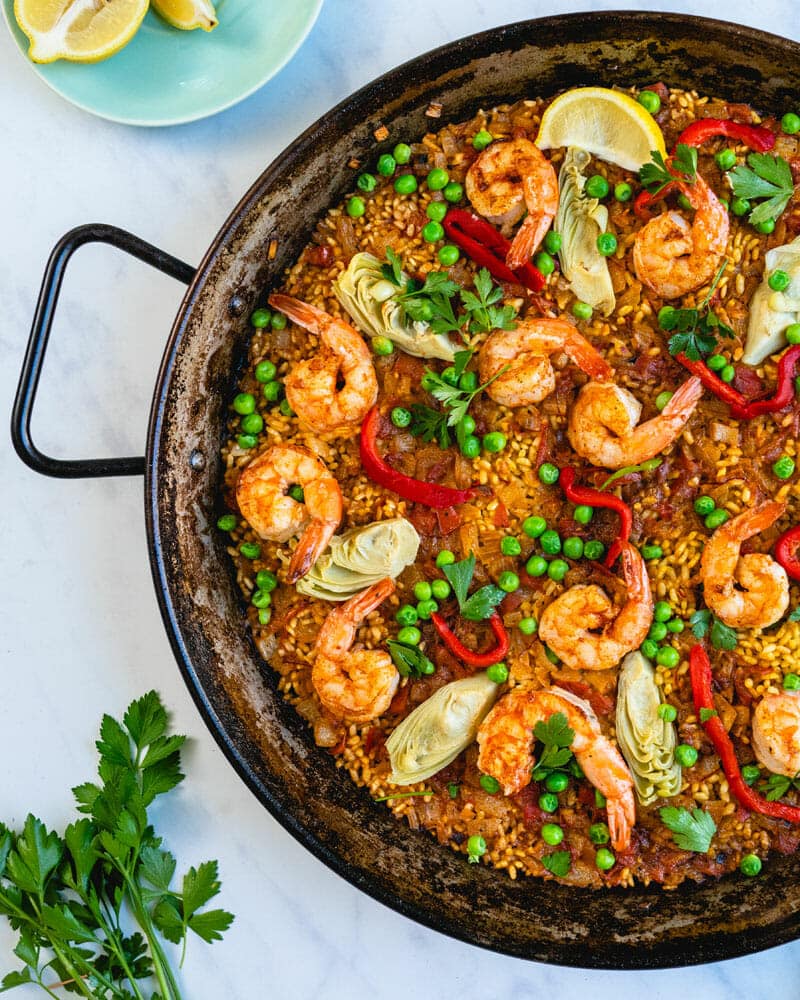
Do not stir this paella recipe!
Once all the ingredients are added to the pan in paella, here’s what to do…or really, what not to do. Don’t stir it! Please repeat: no stirring allowed. The broth and spices boil through the rice, leaving everything perfectly flavored and cooked.
Traditionally, it’s good to get a brown crust on the bottom of the rice (perfectly brown, without burning it). The Spanish call this socarrat. It’s difficult to achieve the perfect socarrat because so much depends on the exact timing. It’s also a little harder to get it if you’re using a skillet. But never fear! Each time you cook this recipe, you’ll learn new things about perfecting your paella technique.
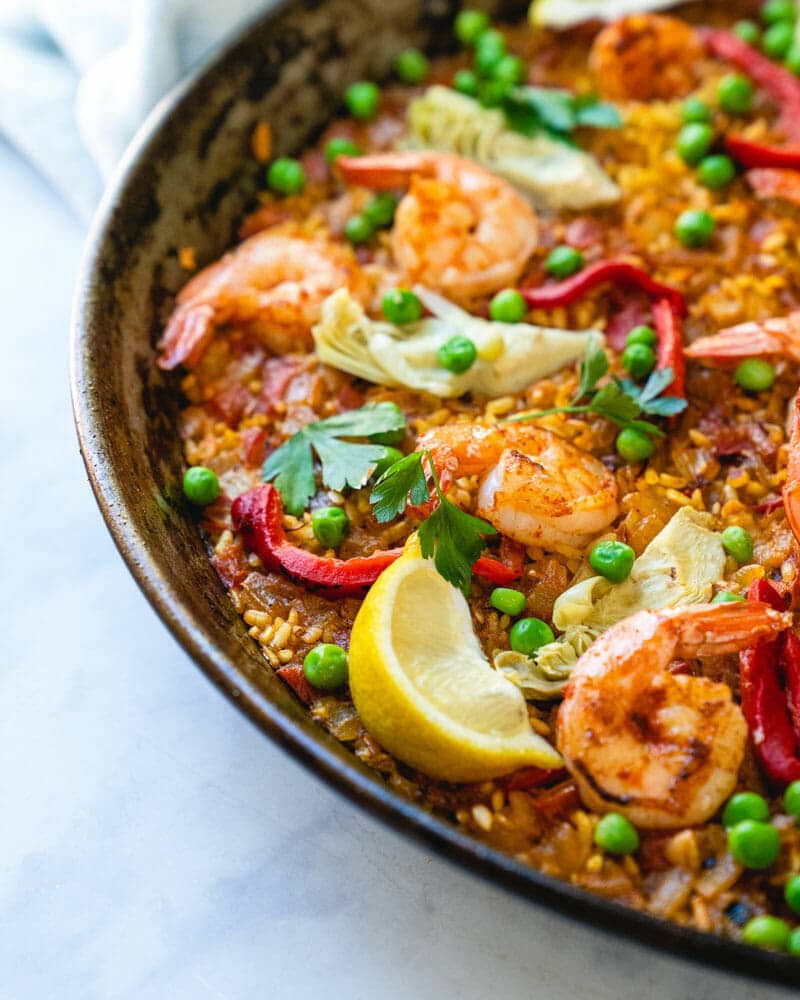
Variation: vegan and vegetarian paella
Don’t want to make a shrimp paella recipe? No problem. We love making vegan and vegetarian paella as well. (Or go to this Easy Vegetarian Paella.) Here’s what to do to customize this recipe:
- Omit the shrimp! Obviously.
- Add 1 15-ounce can chickpeas (1 ½ cups cooked). Drain and rinse them, then add them when you add the vegetable broth.
- Increase the salt by ¼ teaspoon. You’ll need it to flavor the chickpeas.
What to serve with paella?
Making this paella as part of a dinner? Here’s are some first course and side dish ideas for what to serve with paella:
- Marinated Olives These are a fantastic appetizer to eat while the paella cooks! Add slices of Manchego cheese to make it more filling.
- Crusty Bread It’s simple and classic! Try artisan bread or grab a baguette.
- Pan Con Tomate Even better, tomato bread is super classic and insanely tasty.
- Classic Gazpacho Start out with the traditional cold soup.
- Easy Arugula Salad or Celery Salad with Apples These simple salads pair well with the Mediterranean flavors.
This paella recipe is…
Gluten-free, pescatarian, and dairy-free. For vegetarian, plant-based, and dairy-free, see the section above.
Print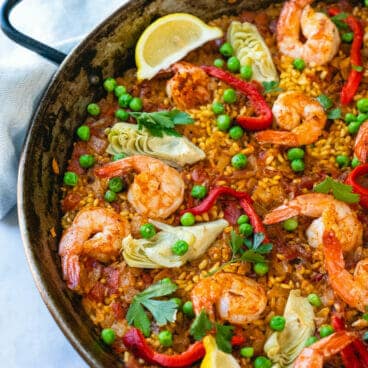
Spanish Paella Recipe
- Prep Time: 15 minutes
- Cook Time: 30 minutes
- Total Time: 40 minutes
- Yield: 4 1x
Description
Here’s how to make a paella recipe…the Spanish way! This stunning one pan dinner features shrimp, vegetables and all the authentic flavors of this traditional dish.
Ingredients
- 1 medium yellow onion
- 6 garlic cloves
- 2 to 3 roma or plum tomatoes (1 ½ cups finely chopped)
- ¼ cup olive oil, divided
- 1/2 pound shrimp, peel and deveined*
- 1 ½ teaspoons smoked paprika, divided
- ¼ teaspoon red pepper flakes
- 1 large pinch saffron
- 1 ½ teaspoons kosher salt, divided
- 3 cups seafood stock or vegetable stock
- 1 ½ cups short grain Bomba rice or arborio rice
- ¼ cup frozen peas, thawed under water
- ½ cup artichoke hearts, quartered
- 1 to 2 roasted red bell peppers, cut into strips
- Lemon wedges from ½ lemon
- Chopped parsley, for garnish
Instructions
- Prep the vegetables: Mince the onion. Mince the garlic. Finely chop the tomatoes, removing the cores but keeping the seeds with their juices.
- Measure out the ingredients: Measure out all the remaining ingredients before you start. The cooking process goes fast!
- Cook the shrimp: Dry the shrimp and add it to a bowl with ½ teaspoon smoked paprika and ¼ teaspoon kosher salt. In your largest skillet or a 4-serving paella pan, heat 1 tablespoon olive oil over medium heat. Add the shrimp and saute until it is just barely opaque, about 1 to 2 minutes per side. Remove the shrimp and set it aside.
- Cook the paella: In the same pan, heat 3 tablespoons olive oil on medium heat. Saute the onion and garlic until just translucent, about 3 minutes, stirring frequently. Add the chopped tomatoes, the remaining 1 teaspoon smoked paprika and red pepper flakes, and cook until the tomatoes have broken down and most of the liquid is evaporated, about 5 minutes. Stir in the stock, saffron and 1 ¼ teaspoon kosher salt. Sprinkle the rice evenly across the broth and tap the pan with a spoon to evenly spread the rice. Bring to a medium simmer and cook without stirring until liquid is absorbed, about 18 to 22 minutes (adjust the cook time as necessary if using a skillet).
- Adjust the heat as necessary: If your pan is large enough to span multiple burners on your stovetop, adjust the heat on each burner so you achieve a steady medium simmer. Rotate the pan every few minutes for an even cook.
- Add the artichoke, peas and roasted red pepper: When the top of the rice is beginning to show through the liquid (about 10 minutes into the cook time), press the artichokes and peas lightly into the rice. Add the strips of red pepper over the top.
- Assess whether the paella is done: In last few minutes, carefully watch the paella and rotate pan more frequently. As the paella finishes, you’ll see the steam start to slow down as the water cooks out. If desired, peek at the bottom of a pan by using a knife to scrape back the rice — you shouldn’t see any standing water. The sound will start to change from a simmer to a crackle. This indicates the crust is forming. Let the crackling continue for about 2 minutes before removing from the heat. If you smell any burning, remove immediately.
- Add the shrimp and serve: When the paella is done, add the shrimp to top of paella and squeeze the lemon wedges onto the top of the pan. Sprinkle with a pinch or two of kosher salt and add the parsley, if using. Serve with additional lemon wedges.
Notes
*Vegetarian and vegan variation: Go to Easy Vegetarian Paella.
- Category: Main Dish
- Method: Stovetop
- Cuisine: Spanish
- Diet: Gluten Free
Keywords: Paella Recipe, Paella
More paella recipes
Love paella? Here are a few more options to try:
- Seafood Paella on an Open Fire Yes, you can make it on an open fire! It’s perfect for summer entertaining.
- Grilled Paella Recipe Can you grill paella? You bet! Here’s our master method.
- Easy Shrimp Paella Here’s another easy shrimp paella perfect for weeknight cooking.








Love it! It‘s simple and made very fast 🌞 A great dish for a summer night with friends in your garden! Best wishes and thank you for this amazing recipe.
★★★★★
So glad you enjoyed!
Seems like I had to add 1 cup extra broth to get this to cook. I used Arborio rice, is that the reason?
You probably had it on slightly too high of a simmer, which causes the liquid to cook out before the rice is done.
Made this tonight and was EXCELLENT! Did have to use 4 cups stock for the aboria rice but was delicious and will definitely make it again. Thanks
★★★★★
I have not yet tried to make this recipe but I sure would love to my boyfriend talks about paella all the time so I will want to make it for him I love to cook I love to experiment with new stuff and I will make this as soon as I can and I will get right back to you thank you so much for sharing
Paella never has peas.
:)
Paellas, even the classic Paella Valenciana, could have or not have peas. This is an optional ingredient. In Spain, in the months of peas collection (around May), paellas tend to use peas since these are easily available at good prices. regards
★★★★★
Is this recipe calling for 4.5 cups of rice or 2 cups total please?
This recipe is for 1 1/2 cups.
Paella never has onion! It makes the rice absorb too much water.
Greetings from Vega Baja, Alicante
★★★
This recipe looks wonderful. I am hoping to try it soon. I was wondering if I could use orzo instead of rice and if I would need to adjust for it. I have a daughter who has a rice allergy.
That should work, the cook time would likely be a lot less!
I rarely leave reviews or comments, but given that somebody left a three star review and it appeared that they did not even make this dish, I thought that I ought to chime in. I made this last night and it was FABULOUS. My husband and I loved the way the full flavors of the vegetables, herbs and spices blended to create a mouthful of bliss! I am not a fan of peas, so I looked up other green vegetables that can be served in paella and green beans were suggested. I used fresh green beans and only a few. I followed everything else to the letter except subbing my homemade chicken stock for the vegetable stock. I believe that even without the changes that this recipe is a winner. I cannot wait to make it for guests!
★★★★★
So glad you enjoyed! Thank you for the comment.
Great recipe and easy to make.
★★★★★
Dear Sonja and Alex, saying ‘hi’ from wintery Australia. My vegetarian husband loves paella so we use whatever veggies we have on hand – sorry purists but that includes peas :) I do the prep and he does the turning and it makes for a fun weekend experience (cooking while chatting over a glass of wine). Thank you for sharing your recipe because food is all about sharing,
Pam and Trevor from Canberra
★★★★★
Thank you!